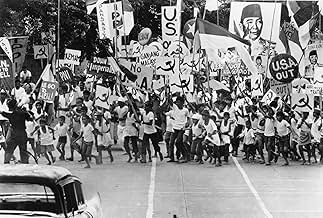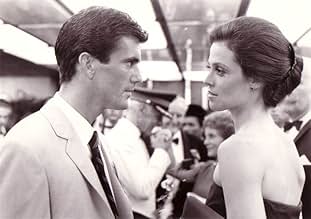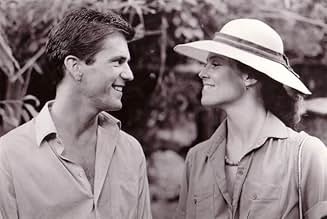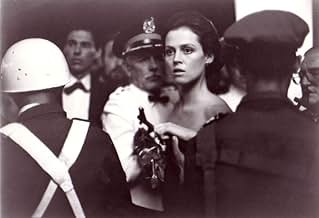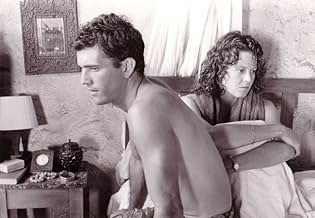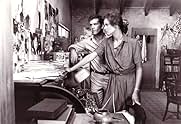IMDb-BEWERTUNG
7,1/10
24.103
IHRE BEWERTUNG
Ein junger australischer Reporter versucht mit Hilfe eines winzigen Fotografen durch die politischen Turbulenzen Indonesiens während der Herrschaft von Präsident Sukarno zu navigieren.Ein junger australischer Reporter versucht mit Hilfe eines winzigen Fotografen durch die politischen Turbulenzen Indonesiens während der Herrschaft von Präsident Sukarno zu navigieren.Ein junger australischer Reporter versucht mit Hilfe eines winzigen Fotografen durch die politischen Turbulenzen Indonesiens während der Herrschaft von Präsident Sukarno zu navigieren.
- 1 Oscar gewonnen
- 10 Gewinne & 14 Nominierungen insgesamt
Empfohlene Bewertungen
This excellent movie is set in 1965 Indonesia, when an Australian reporter named Gay Hamilton is assigned on his first work as a foreign journalist. His apparently simple mission to Yakarta soon turns hot when he interviews a rebel leader , while President Sukarno was toppling by pressure left from communists and right from military. Guy soon is the hottest reporter with the help of his photographer, a native, half- Chinese midget named Kwan . Eventually Hamilton must confront moral conflicts and the relationship between Billy and him reaches some problems connected with a British diplomatic attaché , at the same time the political upheaval takes place in coup détat.
Mel Gibson is good as correspondent covering a conflict and finding himself becoming personally involved when he befriends a free-lance photographer named Billy Kwan and falling for a beautiful Embassy assistant, a mesmerizing Sigourney Weaver .The movie has its touching moments found primarily in the superb supporting performances as Michael Murphy as lively journalist , Bill Kerr as veteran Colonel and of course diminutive Linda Hunt who steals the show as sensible photographer in her Academy Award-winning character, a woman acting a man, and well deservedly prized. Moving and intimate musical score though composed by synthesizer by Maurice Jarre. Atmospheric cinematography that adequate as a mood-piece by Russell Boyd.
The motion picture is stunningly directed by Australian director Peter Weir who achieved several hits (Witness, Gallipoli, The last wave) and some flop (Mosquito coast, The plumber). The movie belongs to sub-genre that abounded in the 80s about reporters around the world covering dangerous political conflicts , such as Nicaragua in ¨Under fire¨ by Robert Spottswoode with Nick Nolte , Gene Hackman and Joanna Cassidy, Salvador in ¨Salvador¨ by Oliver Stone with James Woods and James Belushi, and Libano in ¨Deadline¨ by Nathaliel Gutman with Christopher Walken and Hywel Bennett. These movies are very much in the vein of ¨The year of living dangerously¨.
Mel Gibson is good as correspondent covering a conflict and finding himself becoming personally involved when he befriends a free-lance photographer named Billy Kwan and falling for a beautiful Embassy assistant, a mesmerizing Sigourney Weaver .The movie has its touching moments found primarily in the superb supporting performances as Michael Murphy as lively journalist , Bill Kerr as veteran Colonel and of course diminutive Linda Hunt who steals the show as sensible photographer in her Academy Award-winning character, a woman acting a man, and well deservedly prized. Moving and intimate musical score though composed by synthesizer by Maurice Jarre. Atmospheric cinematography that adequate as a mood-piece by Russell Boyd.
The motion picture is stunningly directed by Australian director Peter Weir who achieved several hits (Witness, Gallipoli, The last wave) and some flop (Mosquito coast, The plumber). The movie belongs to sub-genre that abounded in the 80s about reporters around the world covering dangerous political conflicts , such as Nicaragua in ¨Under fire¨ by Robert Spottswoode with Nick Nolte , Gene Hackman and Joanna Cassidy, Salvador in ¨Salvador¨ by Oliver Stone with James Woods and James Belushi, and Libano in ¨Deadline¨ by Nathaliel Gutman with Christopher Walken and Hywel Bennett. These movies are very much in the vein of ¨The year of living dangerously¨.
I just caught TYOLD again on PBS, not having seen it for perhaps ten years. Wonder of wonders, compared to many other films of the early '80s, this one is just as riveting as it was when I first saw it and doesn't look like it has aged a minute. In addition I am picking up many nuances of the film that I had never seen before.
What I know, and knew, about the tribulations of Indonesia in the 1960's is contained in the reels of this film. The subject matter is so far outside of the typical Western/American perspective that it is amazing that the film got made. Gibson is very good as Guy Hamilton, and his performance is much more lean and energetic than what he has done since - he hadn't had years of Hollywood gloss and Lethal Weapon familiarity to file down his performances into the predictable boxes they have become. Sigourney Weaver is elegant, although her English accent is never really convincing and sometimes disappears altogether. Linda Hunt's portrayal of Billy Kwan is astonishing and won her a well-deserved Oscar in an incredible gender-switching performance that was inspired casting.
One thing I never noticed before was how Billy placed each of the three main characters in their perspective as the Indonesian puppets he explains to Guy. Arjuna, the hero who can be fickle and selfish (Guy). The princess he will fall in love with (Weaver's character). And the dwarf, who carries the wisdom for Arjuna (Billy Kwan).
I haven't much more to say about this film aside from how much I admire it and recommend it to anyone who hasn't seen it. Beautifully shot, well paced, with good performances and about an interesting and important subject matter, it is well worth your time.
What I know, and knew, about the tribulations of Indonesia in the 1960's is contained in the reels of this film. The subject matter is so far outside of the typical Western/American perspective that it is amazing that the film got made. Gibson is very good as Guy Hamilton, and his performance is much more lean and energetic than what he has done since - he hadn't had years of Hollywood gloss and Lethal Weapon familiarity to file down his performances into the predictable boxes they have become. Sigourney Weaver is elegant, although her English accent is never really convincing and sometimes disappears altogether. Linda Hunt's portrayal of Billy Kwan is astonishing and won her a well-deserved Oscar in an incredible gender-switching performance that was inspired casting.
One thing I never noticed before was how Billy placed each of the three main characters in their perspective as the Indonesian puppets he explains to Guy. Arjuna, the hero who can be fickle and selfish (Guy). The princess he will fall in love with (Weaver's character). And the dwarf, who carries the wisdom for Arjuna (Billy Kwan).
I haven't much more to say about this film aside from how much I admire it and recommend it to anyone who hasn't seen it. Beautifully shot, well paced, with good performances and about an interesting and important subject matter, it is well worth your time.
I had forgotten what it is to inhabit the frame, that is to be immersed not only in the world these characters experience but in the sensations made available in it. To feel a draught of air or the scorching heat.
Peter Weir here in his best period reminds me again. His fascination in this period with the otherworldly is firstly Australian, that of a man awed by the mysteries of an alien, ancient landscape that trumps comprehension, outlasts our follies and dreams, then foremostly mystical, implying a communion with worlds beyond.
In this world answers are denied us, and we can only hear vague echoes of the questions we have asked. This is Picnic at Hanging Rock as well as The Last Wave and The Year of Living Dangerously, the tingle of excitement and fear before this enormous complexity to which we are only small and transient. The Hanging Rock here becomes Jakarta.
These visions of Jakarta, a veritable jungle of humanity teeming with passions and cruelties, he presents from a point of view that communicates alienation and fear. When our white characters venture out into the crowded slums, human misery reaches out at them with filthy gaunt arms. All this he doesn't merely document for the sake of political discourse, he stylizes as an experience meant to stir things in the soul. This also outlines Weir's limitations; that these visions are perhaps too tawdry, the savages noble and the gnomes magical.
All this in mind, the film is best experienced for me as a spiritual journey. But towards what?
A dwarf is our guide through this, an ominpresent being that seems to create the story we are watching, an avatar of the filmmaker's consciousness. He narrates our hero's arrival, then makes him see his limits by offering him his folly, the desire for an exclusive story. In a poignant scene early in the film, holding shadow puppets before a canvas screen, he reveals to him a fundamental tenet of Buddhist thought. How desire clouds the soul so that reality itself becomes concave.
This is not always perfect of course, Peter Weir is no Antonioni after all. Our hero eventually gives up the big scoop to pursue love, but this is accomplished through violence perpetrated to him rather than a personal realization that comes from having experienced the folly of the mind (which Antonioni brilliantly dismantles for us in Blowup). Lying halfdead on a filthy bed somewhere in Jakarta, he remembers the wise words of how desire blinds the soul, but is none the wiser.
He doesn't willingly give up anything, which is to say even if his precious tape recorder (the tool by which he records the world, seeking "truth") is snatched from him in the airport at the last moment, he has essentially lost nothing that he doesn't carry inside of him.
Perhaps this is the film's apogee then, that faced with a chaos and violence which outlasts them and reveals them to be small and diminutive, mere specs of sand in the cosmic beach, the characters of the film stubbornly remain the same, having brushed off that encounter only as an exciting, dangerous escapade into the dark side.
The weather reflects that chaos in Weir's films, acting as an agent of transience whereby the world is shown to be in constant flux and motion. But the characters are phazed little by this, anxious to pursue their desires and enact their little charades of meaning. When a tropic downpour suddenly rains down on them, they laugh and play in it.
But if Weir's fascination with the mystical is entirely white Australian, his cinema is elemental, Aboriginal. Here is the communion made possible.
The fact that he unerringly insists to submerge his characters in these impenetrable worlds that defy understanding, where the sole reward is a moment's glimpse of the soul in spiritual hazard, means that the glimpse is reward enough because for that moment the apparent reality is peeled back to afford us a gaze into a yawning universe beyond. This yearning for the mechanisms of the universe to be made apparent is in itself the primal, ultimate urge of these films. The Last Wave takes us on the brink and gives us a vision of apocalypse (a revelation), this one stops just short of that.
Peter Weir here in his best period reminds me again. His fascination in this period with the otherworldly is firstly Australian, that of a man awed by the mysteries of an alien, ancient landscape that trumps comprehension, outlasts our follies and dreams, then foremostly mystical, implying a communion with worlds beyond.
In this world answers are denied us, and we can only hear vague echoes of the questions we have asked. This is Picnic at Hanging Rock as well as The Last Wave and The Year of Living Dangerously, the tingle of excitement and fear before this enormous complexity to which we are only small and transient. The Hanging Rock here becomes Jakarta.
These visions of Jakarta, a veritable jungle of humanity teeming with passions and cruelties, he presents from a point of view that communicates alienation and fear. When our white characters venture out into the crowded slums, human misery reaches out at them with filthy gaunt arms. All this he doesn't merely document for the sake of political discourse, he stylizes as an experience meant to stir things in the soul. This also outlines Weir's limitations; that these visions are perhaps too tawdry, the savages noble and the gnomes magical.
All this in mind, the film is best experienced for me as a spiritual journey. But towards what?
A dwarf is our guide through this, an ominpresent being that seems to create the story we are watching, an avatar of the filmmaker's consciousness. He narrates our hero's arrival, then makes him see his limits by offering him his folly, the desire for an exclusive story. In a poignant scene early in the film, holding shadow puppets before a canvas screen, he reveals to him a fundamental tenet of Buddhist thought. How desire clouds the soul so that reality itself becomes concave.
This is not always perfect of course, Peter Weir is no Antonioni after all. Our hero eventually gives up the big scoop to pursue love, but this is accomplished through violence perpetrated to him rather than a personal realization that comes from having experienced the folly of the mind (which Antonioni brilliantly dismantles for us in Blowup). Lying halfdead on a filthy bed somewhere in Jakarta, he remembers the wise words of how desire blinds the soul, but is none the wiser.
He doesn't willingly give up anything, which is to say even if his precious tape recorder (the tool by which he records the world, seeking "truth") is snatched from him in the airport at the last moment, he has essentially lost nothing that he doesn't carry inside of him.
Perhaps this is the film's apogee then, that faced with a chaos and violence which outlasts them and reveals them to be small and diminutive, mere specs of sand in the cosmic beach, the characters of the film stubbornly remain the same, having brushed off that encounter only as an exciting, dangerous escapade into the dark side.
The weather reflects that chaos in Weir's films, acting as an agent of transience whereby the world is shown to be in constant flux and motion. But the characters are phazed little by this, anxious to pursue their desires and enact their little charades of meaning. When a tropic downpour suddenly rains down on them, they laugh and play in it.
But if Weir's fascination with the mystical is entirely white Australian, his cinema is elemental, Aboriginal. Here is the communion made possible.
The fact that he unerringly insists to submerge his characters in these impenetrable worlds that defy understanding, where the sole reward is a moment's glimpse of the soul in spiritual hazard, means that the glimpse is reward enough because for that moment the apparent reality is peeled back to afford us a gaze into a yawning universe beyond. This yearning for the mechanisms of the universe to be made apparent is in itself the primal, ultimate urge of these films. The Last Wave takes us on the brink and gives us a vision of apocalypse (a revelation), this one stops just short of that.
It's 1965 Jakarta in Indonesia under the brutal rule of President Sukarno. Guy Hamilton (Mel Gibson) is on his first foreign assignment for the Australian Broadcasting Service. He is befriended by photographer half-Chinese dwarf Billy Kwan (Linda Hunt). There is an air of anti-western feeling. Guy is lost without connections until Billy starts helping him out. He has an affair with British diplomat Jill Bryant (Sigourney Weaver). It's a world of murky Cold War politics, secrets and trying morality.
This has a great exotic atmosphere. The movie has a sense of impending doom. Mel Gibson is terrific and shows his superior star power. Linda Hunt creates such a compelling character. It does need to heighten the tension a little. The plot meanders in this murky world. It needs a direction. Nevertheless I just love the dark exotic mood.
This has a great exotic atmosphere. The movie has a sense of impending doom. Mel Gibson is terrific and shows his superior star power. Linda Hunt creates such a compelling character. It does need to heighten the tension a little. The plot meanders in this murky world. It needs a direction. Nevertheless I just love the dark exotic mood.
Peter Weir's movie, set in Sukarno's Indonesia in 1965, can be seen as four films in one. The first is socio-political, focusing on the plight of the impoverished Indonesian people, the impending insurrection by the communist movement, and the bloody, chaotic aftermath of the coup. The second, coloured in Graham Greene-ish tones, has a cast of western journalists and diplomats failing to make sense of what's happening around them, and falling back on sex, drink and cynicism. The third - and most important in commercial-cinema terms - is a convincingly acted romance between rookie foreign correspondent Guy Hamilton (Mel Gibson) and British diplomat Jill Bryant (Sigourney Weaver), culminating in an unlikely and sentimental ending to the film.
But it is the fourth of these "sub-movies" which is the most intriguing; this concerns the diminutive and enigmatic Australian/Chinese photographer Billy Kwan, an astonishing - and Oscar winning - portrayal by actress Linda Hunt. Billy sees himself as a puppet-master, pulling the strings of friends and colleagues, particularly of Jill and Guy, whom he throws together. But his need to take control also motivates him to help local people, not through indirect and political means, but directly like an early Christian, and this apparently benign course leads to tragedy. Billy is the true heart and conscience of this film.
Weir is not entirely successful in weaving these strands together, and leaves a few gaps in both plot and characterisation. He is also occasionally guilty of melodrama (a fault which, in the movie, Jill warns Guy about), especially in the film's closing scenes - though certainly not where he shows communist sympathisers being shot, which is factual. On the whole, however, the movie works on both commercial and artistic levels, and should be seen.
But it is the fourth of these "sub-movies" which is the most intriguing; this concerns the diminutive and enigmatic Australian/Chinese photographer Billy Kwan, an astonishing - and Oscar winning - portrayal by actress Linda Hunt. Billy sees himself as a puppet-master, pulling the strings of friends and colleagues, particularly of Jill and Guy, whom he throws together. But his need to take control also motivates him to help local people, not through indirect and political means, but directly like an early Christian, and this apparently benign course leads to tragedy. Billy is the true heart and conscience of this film.
Weir is not entirely successful in weaving these strands together, and leaves a few gaps in both plot and characterisation. He is also occasionally guilty of melodrama (a fault which, in the movie, Jill warns Guy about), especially in the film's closing scenes - though certainly not where he shows communist sympathisers being shot, which is factual. On the whole, however, the movie works on both commercial and artistic levels, and should be seen.
Wusstest du schon
- WissenswertesDirector Peter Weir cast Linda Hunt in the role of Billy Kwan after failing to find an actor who could play the part the way he wanted.
- PatzerBilly's still camera is a Nikon F2 Photomic, which was not released until 1971, while the film takes place in 1965.
- Zitate
Billy Kwan: What then must we do? We must give with love to whoever God has placed in our path.
- VerbindungenFeatured in Peter Weir Industry Seminar 1989 (1989)
- SoundtracksBeim Schlafengehen
from "Four Last Songs"
by Richard Strauss
Performed by Kiri Te Kanawa and London Symphony Orchestra
Conducted by Andrew Davis
Courtesy of CBS Masterworks
Published by Boosey-Hawkes
Top-Auswahl
Melde dich zum Bewerten an und greife auf die Watchlist für personalisierte Empfehlungen zu.
Details
- Erscheinungsdatum
- Herkunftsländer
- Sprachen
- Auch bekannt als
- El año que vivimos en peligro
- Drehorte
- Produktionsfirmen
- Weitere beteiligte Unternehmen bei IMDbPro anzeigen
Box Office
- Budget
- 13.000.000 $ (geschätzt)
- Bruttoertrag in den USA und Kanada
- 10.278.575 $
- Eröffnungswochenende in den USA und in Kanada
- 35.000 $
- 23. Jan. 1983
- Weltweiter Bruttoertrag
- 10.278.575 $
Zu dieser Seite beitragen
Bearbeitung vorschlagen oder fehlenden Inhalt hinzufügen

